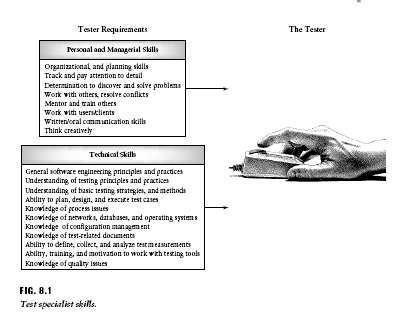Chapter: Software Testing : Test Management
Skills needed by a test specialist
Skills needed by a test
specialist
Given the
nature of technical and managerial responsibilities assigned to the tester that
are listed in Section 8.0, many managerial and personal skills are necessary
for success in the area of work. On the personal
and managerial level a test
specialist must have:
• organizational,
and planning skills;
• the
ability to keep track of, and pay attention to, details;
• the
determination to discover and solve problems;
• the
ability to work with others and be able to resolve conflicts;
• the
ability to mentor and train others;
• the
ability to work with users and clients;
• strong
written and oral communication skills;
• the
ability to work in a variety of environments;
• the
ability to think creatively
The first
three skills are necessary because testing is detail and problem oriented. In
addition, testing involves policymaking, a knowledge of different types of
application areas, planning, and the ability to organize and monitor
information, tasks, and people. Testing also requires inter actions with many
other engineering professionals such as project managers, developers, analysts,
process personal, and software quality assurance staff. Test professionals
often interact with clients to prepare certain types of tests, for example
acceptance tests. Testers also have to prepare test-related documents and make
presentations. Training and mentoring of new hires to the testing group is also
a part of the tester‘s job. In addition, test specialists must be creative,
imaginative, and experimentoriented.
They need
to be able to visualize the many ways that a software item should be tested,
and make hypotheses about the different types of defects that could occur and
the different ways the software could fail. On the technical level testers need to have:
•
an education that includes an understanding of
general software engineering principles, practices, and methodologies;
• strong
coding skills and an understanding of code structure and behavior;
• a good
understanding of testing principles and practices;
• a good
understanding of basic testing strategies, methods, and techniques;
•
the ability and experience to plan, design, and
execute test cases and test procedures on multiple levels (unit, integration,
etc.);
• a
knowledge of process issues;
• knowledge
of how networks, databases, and operating systems are organized and how they
work;
• a
knowledge of configuration management;
• a
knowledge of test-related documents and the role each documents plays in the
testing process;
• the
ability to define, collect, and analyze test-related measurements;
• the
ability, training, and motivation to work with testing tools and equipment;
• a
knowledge of quality issues.

In order
to carry out testing tasks testers need to have knowledge of how requirements,
specifications, and designs are developed and how different methodologies can
be applied. They should understand how errors and defects are introduced into
the software artifacts even at early stages of the life cycle. Testers should
have strong programming backgrounds to help them visualize how code works, how
it behaves, and the possible defects it could contain. They also need coding
experience to support the development of the test harnesses which often involve
a considerable coding effort in themselves.
Testers
must have a knowledge of both white and black box techniques and methods and
the ability to use them to design test cases. Organizations need to realize
that this knowledge is a necessary prerequisite for tool use and test
automation. Testers need to understand the need for multilevel tests and
approaches used for testing at each level
Related Topics